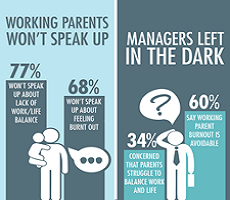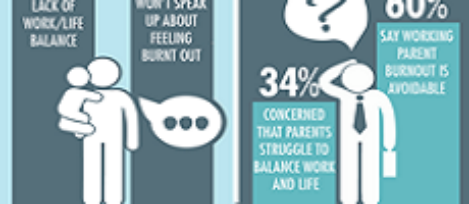October 13, 2015
Working parents suffer in silence, as managers kept in the dark 0
 A new US study of working parents and their managers has found that the combination of work and family responsibilities is causing parents anxiety and depression and keeping them from doing their best at work. The study, the second annual Modern Family Index commissioned by Bright Horizons Family Solutions explored the challenges working parents have in managing their work and family responsibilities and the impact these challenges have on employers. It found that working mothers and fathers feel it’s extremely important to work for a company that supports the needs of working parents (62 percent) and has a culture that addresses their family responsibilities (53 percent). However, there is a growing disconnect between managers and employees about how working parents are feeling. This may be attributed to the fact that even in 2015, most are reluctant to share their concerns with their employers.
A new US study of working parents and their managers has found that the combination of work and family responsibilities is causing parents anxiety and depression and keeping them from doing their best at work. The study, the second annual Modern Family Index commissioned by Bright Horizons Family Solutions explored the challenges working parents have in managing their work and family responsibilities and the impact these challenges have on employers. It found that working mothers and fathers feel it’s extremely important to work for a company that supports the needs of working parents (62 percent) and has a culture that addresses their family responsibilities (53 percent). However, there is a growing disconnect between managers and employees about how working parents are feeling. This may be attributed to the fact that even in 2015, most are reluctant to share their concerns with their employers.












 This week the UK’s Health Secretary found himself at the centre of a storm because of
This week the UK’s Health Secretary found himself at the centre of a storm because of 






















October 11, 2015
How biodynamic lighting stimulates sense and performance at work 0
by Peter Young • Comment, Products, Wellbeing, Workplace design
(more…)